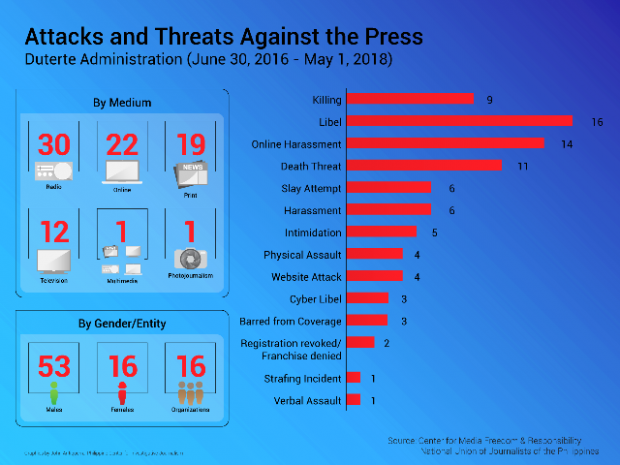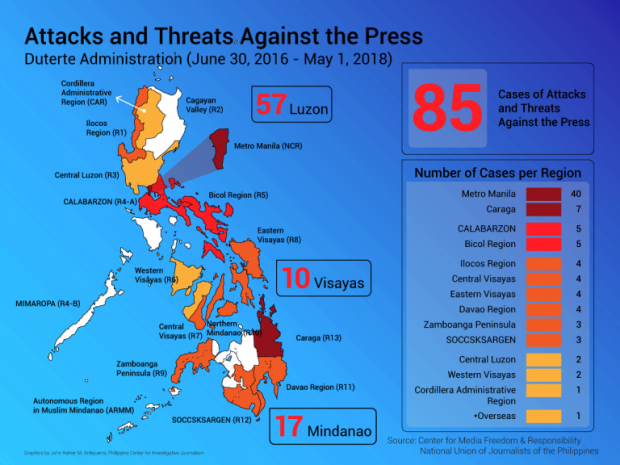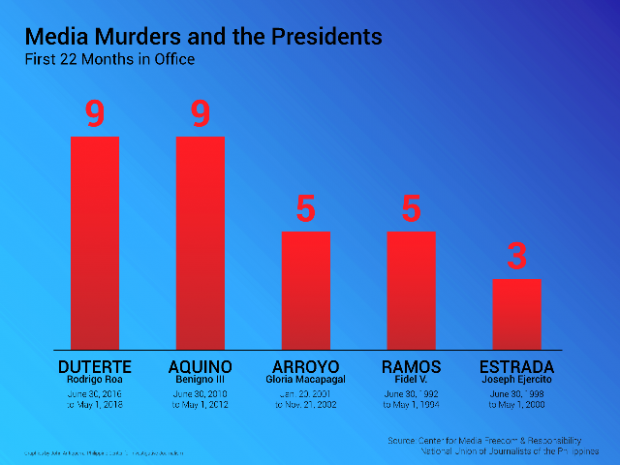World Press Freedom Day, May 3, 2018
Manila, Philippines
A Report by the Center for Media Freedom and Responsibility (CMFR),
National Union of Journalists of the Philippines (NUJP),
Philippine Press Institute (PPI), and
Philippine Center for Investigative Journalism (PCIJ)
RODRIGO R. Duterte’s presidency has altered and controlled the public discourse so radically in its favor in ways rude and bold. Its tragic result: it has restricted and narrowed the celebrated freedom of the Philippine press and the people’s cherished right to know.
In his first 22 months in power, Mr. Duterte has earned the dubious honor of logging 85 various cases of attacks and threats on these dual values that the Constitution upholds as inalienable rights of the citizens. The number far exceeds those recorded under four presidents before him.
Separately and together, these 85 cases — murders, death threats, slay attempts, libel, online harassment, website attacks, revoked registration or denied franchise renewal, verbal abuse, strafing, and police surveillance of journalists and media agencies from June 30, 2016 to May 1, 2018 — have made the practice of journalism an even more dangerous endeavor under Duterte.
These cases project the force of presidential power dominating the political sphere, with zealous support from Duterte allies and appointees, and their sponsored misinformation army online and off. They have hurled at members of the press insults and unfair labels, and allegations of corruption and misconduct without firm basis in fact or in law.
These cases linger amid effete efforts at solution by state agencies, and in the context of the hostile and vicious discourse against the administration’s critics and the critical media.
The President, Cabinet members, and the House of Representatives have imposed and proposed unprecedented restrictions on journalist access to official news events. Congress and executive agencies have denied or delayed the corporate registration or franchises required for operation of media companies.
Some journalists and media groups have also reported police surveillance of their movement and their places of work.
Attacks on press freedom diminish not just the news media. These weaken the capacity of the news media to sustain the people’s unfettered exchange of ideas about public issues. Presidential intolerance of criticism is now a well-established aspect of Duterte’s leadership. While he is not the only chief executive who has become sensitive to press criticism, Duterte has made sure that everyone understands that misfortunes could hound and befall his critics.
And yet Duterte has promised change; his government should wish to tell the people when and where change has come to fruition, and whether it has triggered better or worse results. By keeping citizens and voters fully informed, the media empowers the public to check whether those they elected to power are doing right or wrong. A free press sustains and strengthens democracy.
So far, that is not quite the situation under Duterte. Intimidated, restrained, and threatened with consequences, the news media have been significantly restricted to report well and fully on the war on drugs, the siege of Marawi, cases of alleged corruption in high office, questions about the wealth of the Duterte family, the public debate on Charter change and federalism, the shutdown of Boracay, and not the least significant, the incursions of China in the West Philippine Sea.
To be sure, the state of press freedom in the Philippines reflects long standing problems that beset the practice of the press, taking into account the economic inequalities among media organizations, the poor pay for many working in the provinces, and the opportunities for corruption for those vulnerable to political manipulation.
The phrase “attacks and threats” has been used by media watch organizations to sum up the many ways in which a free press is weakened, leading to the failure of its function as well as to its own dysfunctional operations.
Attacks and Threats: 22 Months, 85 Cases
By the diligent and independent monitoring of the Center for Media Freedom and Responsibility (CMFR) and the National Union of Journalists of the Philippines (NUJP), from June 30, 2016 to May 1, 2018, the following cases of attacks of press freedom have been recorded under the Duterte administration:
- 9 journalists had been killed in the line of duty, with their last reports focusing separately on the drug trade, and local crime and corruption.
- 16 libel cases with mostly by state officials/agencies as complainants, including three that had been filed before June 30, 2016. The courts have dismissed two of these three and acquitted the respondent in the third case.
- 14 cases of online harassment, perpetrated mostly by Duterte supporters;
- 11 death threats, after delivering reports critical of public officials, including Duterte;
- 6 cases of slay attempts, mostly by gunmen riding in motorcycles;
- 6 cases of harassment, mostly by state officials/agencies;
- 5 cases of intimidation, mostly by local officials;
- 4 cases of website attack;
- 4 cases of physical assault, mostly by local officials;
- 3 cases of cyber libel;
- 3 instances of reporters barred from coverage, by the Office of the President;
- 2 cases of registration revoked or franchise denial;
- 1 strafing incident that occurred in Region XII; and
- 1 case of verbal assault in Metro Manila, excluding multiple instances when the President himself took verbal broadsides, cursed, and scolded journalists, and threatened certain media agencies with closure.
Nearly all media platforms had been bruised and battered. The 85 cases have affected journalists and media agencies from radio, 30 cases; online, 22 cases; print, 19 cases; television, 12 cases; and online print/radio/TV and photojournalism, 1 case each.
By gender, nearly a third or 53 of the cases involved male journalists, while 16 female journalists and 16 media organizations make up the balance.

By location, nearly half or 40 of the 85 cases occurred in the National Capital Region or Metro Manila. One case of denial of access imposed by Philippine officials occurred in Singapore, to the prejudice of foreign correspondents working in Manila.
No cases were recorded during the period in four regions: Cagayan Valley (Region II), the Autonomous Region in Muslim Mindanao, MIMAROPA (Region IV-B, Southwestern Tagalog) and Northern Mindanao (Region X).
The other regions and their case breakdown follow:
- Region XIII CARAGA, 7 cases;
- Region IV-A, CALABARZON, 5;
- Region V, Bicol Region, 5;
- Region I, Ilocos Region, 4;
- Region VIII, Eastern Visayas, 4;
- Region XI, Davao Region, 4;
- Region IX, Zamboanga Peninsula, 3;
- Region VII, Central Visayas, 4;
- Region XII SOCCSKSARGEN, 3;
- Region III, Central Luzon, 2;
- Region VI, Western Visayas, 2; and
- Cordillera Administrative Region, 1.

Journalist killings
The killing of journalists whether or not in the line of duty is not a new problem. It is linked to other institutional flaws and weaknesses in the government system, not the least of which is the failure to punish, aligned with other conditions described as “a culture of impunity.” Such violence grows as it feeds on the indifference of many, including some working in the media who also believe, as some government officials have claimed, that those who are killed are corrupt. CMFR analysis has shown that corruption has figured only in a small number of cases of journalists killed.
The nine journalists killed during the first 22 months of Duterte’s presidency are a perfect match to the number recorded during the same covered period under Benigno S. Aquino III.
Duterte’s record, however, exceeds those in the first 22 months of Fidel V. Ramos, Gloria Macapagal Arroyo, and Joseph Ejercito Estrada. In the first 22 months in office of Ramos, five journalists were killed, as would be the case during Arroyo’s term. Three journalists were felled during the same period in Estrada’s tenure. Arroyo’s total number during her nine years tops the roster, though, as it included the Ampatuan Massacre of Nov. 23, 2009 where 58 persons, including 32 journalists and media workers, were killed.

While cases have been filed against suspects in some of these killings, most have barely received police investigation. Only the hired gunmen have been arrested and tried, with the masterminds escaping arrest and prosecution.
Of the 156 cases of journalists killed in the line of duty since 1986, only 17 have been partly resolved, with the conviction only of the gunmen while the masterminds remain free. In the case of Bombo Radyo-Kalibobroadcaster Herson Hinolan who was killed on Nov. 13, 2004, the murder case filed against convicted mastermind former Mayor Alfredo Arsenio of Lezo town in Aklan province, has been downgraded to homicide.
The trial of the 188 men charged in the 2009 Ampatuan Massacre entered its eighth year in 2017. The alleged masterminds in the killing of 58 people including 32 journalists are among those charged, together with policemen and paramilitaries in the pay of the Ampatuan clan. So far, only 112 have been arraigned. Not one of the accused has been convicted.
A strongman president could go far, if he chooses, to improve the capacity of police for forensic investigation as well as strengthen the prosecutorial skills of lawyers working in the Department of Justice. Such efforts would redound to the benefit of all Filipinos, especially those without the means to hire their own lawyers, and not just the besieged workers of media.
State-sponsored anti-media propaganda
President Duterte has recklessly accused the news media of inaccuracy and bias, of deliberately spreading “fake news” supposedly to discredit his administration. These accusations are echoed mostly online by Duterte supporters, some of whom have even incited others to commit violence against journalists.
Over social media, journalists and media organizations continue to be attacked by regime-sponsored trolls. Hate speech and threats are perennial and rampant occurrences in the comment sections of reports critical of the administration.
The phenomenon can be traced to 2016 when in an obviously orchestrated campaign, some bloggers and social media pages trumpeted Mr. Duterte’s candidacy for his promise of change. When he won the presidency, these same bloggers and pages continued to function as disseminators of his every word and even of false information. This they do while demonizing, along with the political opposition, his critics, dissenters, including journalists doing their mandated duty of reporting the truth.
Attacks on media organizations now include surveillance of journalists by state security forces. A journalist has reported that his news organization had been subjected to an unwanted police visit. At least two other news organizations have noted plainclothes men around the location of their offices but these organizations decided not to make any attempt to identify who the policemen were and did not report the incident to authorities.
Also reminiscent of martial law, background checks have become a part of Philippine National Police (PNP) protocol for journalists covering the police beat. Members of the PNP Press Corps reported police visits and interrogations. Some of the questions were personal. In January this year, the PNP Chief denied that the checks were going on. But in February, media reported the PNP’s admission that it was indeed doing background checks on reporters newly assigned to cover the PNP.
Controlling the Media
At the center of this shrinking space for press freedom and the people’s right to know stands a leader who has used his power against the press with such hostility and with utter disregard for the constitutional protection of the press from such incursions on press freedom.
Mr. Duterte seems ready to do just as he pleases — heap personal insult at his perceived enemies and proclaim damning charges without evidence to discredit and intimidate the press, from the presidential podium.
Verbal abuse by itself would make the practice of independent journalism more difficult and problematic. But Duterte has unleashed much more violence against the autonomy of the press than has been seen since the overthrow of the Marcos regime in 1986. Indeed, even without the legal instruments used during the period of Marcos-era martial law, the press has been placed effectively under government control.
All the President has had to do is show how he handles his critics and demonstrate what he is capable of doing to anyone who dares to stand up and oppose him.
It can be a missionary sister who is declared persona non grata and ordered deported with haste. It can be a sitting senator detained for imprecise charges. It can be an individual journalist asking an annoying question in a press conference, who is then shamed by his angry outburst complete with expletives. It can be media organizations whose reporters and photojournalists have tracked the deaths of thousands of men, women, and children, that some have described as extra-judicial killings or EJKs.
Rodrigo R. Duterte has brandished the power of fear. His threats and attacks bear the full weight of his office, the highest in the land. No need to test constitutional limits. All he seems to want to do is to make enough journalists understand that they should be very afraid.
But, like fear, courage could be contagious. And unlike fear that disempowers, courage built on the power of truth and the unity of all in media is a force that empowers.
To stand firm and to stand united for press freedom and democracy, to speak truth to power and to keep power in check — this much the press owes the people. Whoever is president, the paramount duty of a free press in a democracy is to defend and uphold the people’s right to know, in courage and in unity. — CMFR, NUJP, PPI, PCIJ, World Press Freedom Day, 3 May 2018







